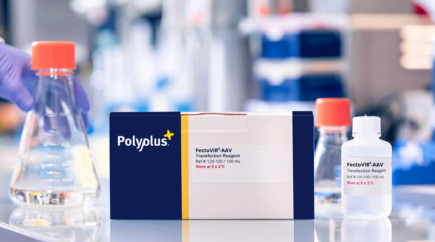Available at research and GMP grade to intensify production of recombinant AAV rAAV viral vectors at any scale from benchtop to 2000L scale bioreactor...

We use cookies to help you navigate efficiently and perform certain functions. You will find detailed information about all cookies under each consent category below.
The cookies that are categorized as "Necessary" are stored on your browser as they are essential for enabling the basic functionalities of the site. ...
Necessary cookies are required to enable the basic features of this site, such as providing secure log-in or adjusting your consent preferences. These cookies do not store any personally identifiable data.
Functional cookies help perform certain functionalities like sharing the content of the website on social media platforms, collecting feedback, and other third-party features.
Analytical cookies are used to understand how visitors interact with the website. These cookies help provide information on metrics such as the number of visitors, bounce rate, traffic source, etc.
Advertisement cookies are used to provide visitors with customized advertisements based on the pages you visited previously and to analyze the effectiveness of the ad campaigns.
Meet our Team at our booth #37 during Bioprocessing Summit Europe, in Barcelona, March, 22-24, 2022! Don't miss our presentations on March 22 & 23 in collaboration with Catalent and VIVEbiotech!
Adeno-associated viral vectors (AAV) are the primary vector used for viral vector-based gene therapies. Some of the challenges facing AAV manufacturing are scalability and the lack of advanced platform processes. This presentation will discuss strategies to develop advanced processes using novel transfection reagents including the results of Catalent’s collaborative study with Polyplus to evaluate the FectoVIR®-AAV reagent for scalable production in suspension HEK-293 cells.
Mathieu Porte, Mégane Denu, Marine Ricordel, Jonathan Havard, Coralie Stritt, Yann Philipson, Malik Hellal, Patrick Erbacher
The number of ATMP therapeutic-based medicines for inherited genetic disorders is in constant growth, with a global 32% increasein new clinical trials in the last 4 years. ATMPs have demonstrated their success with already more than ten approved for commercialization. The success of AAV as the most promising viral vector for gene therapy is due to low immunogenicity, broad tropism and non-integrating properties. One major challenge for translation of promising research to clinical development is the manufacture of sufficient quantities of AAV. Transient transfection of suspension cells is the most commonly usedproduction platform, as it offers significant flexibility for cell and gene therapy development. However, this method presents some limitations in largescale bioreactors: inadequate transfection protocol, reduced transfection efficiency and lower productivity. To address this concern, we present data on a novel transfection reagent showing: i) increased AAV titers, ii) Cost-effectiveness with reduced cost per dose for therapy affordability, iii) improved transfection protocol for large scale bioreactors and iv) reproducibility of viral titers at different production scale. Withour continuous commitment in supporting CGT manufacturers, FectoVIR®-AAV is available at GMP grade, the highest quality grade for ancillary materials aligned with quality standards recommended by health authoritiestoensure patient safety.